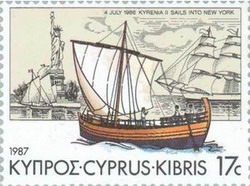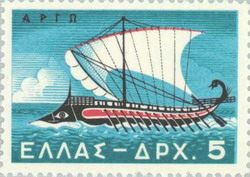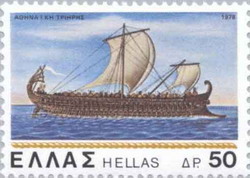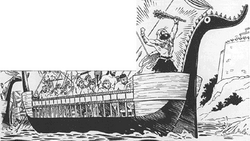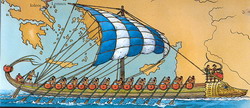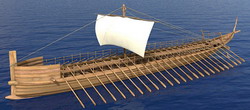The Israelite Sea Captives.
Biblical and Secular Proofs Concerning Ancient Israelites in the West.
To See YouTube Video Clips on this Subject,
SCROLL DOWN!
| Site Contents by Subject |
Home Research Revelation Reconciliation |
|
Publications |
Site Map Contents in Alphabetical Order |
This Site |
|
The Israelite Sea Captives.
Part One: Over the Ocean Blue!
A section of the Ten Tribes were exiled by Way of the Sea. This is a point that Brit-Am research may claim most or nearly all of the credit for demonstrating. We have ALSO been able to show where they went, at least in part.
In old Brit-Am Literature however one does find discussions of Israelites from the Ten Tribes being in Spain though how exactly they got there seems to have been left up in the air.
Brit-Am has shown how:
In addition to transferring Israelites overland the Assyrians used Phoenician and Philistine proxies to transport sections of these Israelites to the West. They were taken at first to Scandinavia and Spain.
The Philistines were predominant in Scandinavia and the Phoenicians in Spain though elements of both were present in the two areas.
From these regions they reached Ireland and the British Isles and Gaul OR to some degree they may also have been settled directly in those areas as well.
We discussed these matters at first in our work "Lost Israelite Identity" (1996) and later (regarding Spain) also in our book Origin (2002). Since publishing these works new publications and researches by archaeologists and historians have strongly strengthened the basic outlines of the scenario we had depicted.
Even so, it should be realized that a lot of work remains to be done and there are many unanswered questions that could be raised.
Below is an outline of part of what we now know:
[Help us to learn more and to continue this research.]
| Different Types of Phoenician Ship | ||
 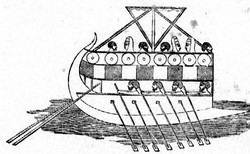 |
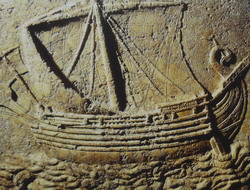 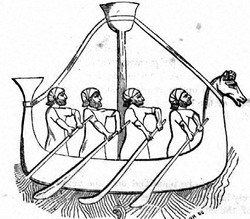
|
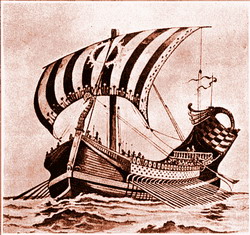 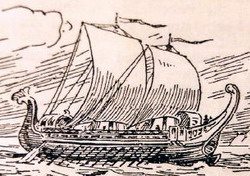
|
See Also:
History: Exile of the Ten Tribes by SEA!
http://britam.org/Ships.html
Tarshish
http://britam.org/Questions/QuesTarshish.html
Places of Exile
The original Twelve Tribes of Israel had split into two kingdoms. Two tribes comprising 'Judah' were in the south. The Ten Tribes of 'Israel' were in the north. The Ten Northern Tribes were entirely taken away by the Assyrians to places in Northern Mesopotamia, to the Caucasus area and to Eastern Iran.The Bible says that,
THE KING OF ASSYRIA TOOK SAMARIA, AND CARRIED ISRAEL AWAY INTO ASSYRIA, AND PLACED THEM IN HALA, AND IN HABOR, AND IN THE CITIES OF THE MEDES (2-Kings 17:6). The Bible also mentions 'Hara' (1-Chronicles 5: 26) in Eastern Iran as a place of exile. The Talmud and archaeological findings enable the identification of these places of re-settlement. Shortly after the exile and re-settlement every one of the said places became a center for a group of peoples who then appeared for the first time. They are known to history as the Cimmerians, Scythians, and Guti or Goths. All these entities were (at least in part) comprised from the Lost Ten Tribes! In addition to places mentioned as places of exile (such as Halah, Habor, the River Gozan, Cities of the Medes, and Hara) Talmudical sources also recall the Snowy Mountains (Sanhedrin 94a), Caspii (Kiddushin 72a), Mountains of Darkness (Numbers Rabah 16:15), Har-Mannae (Targum Yehonatan on Amos 4:3), Sambation (Numbers Rabah 16:15), Afrikey (Sanhedrin 94a), etc. The said names often prove to be alternative appellations for the same or adjacent locations.
Exile by Sea
Isaiah also spoke about the Exile:
Nevertheless the gloom will not be upon her who is distressed,
As when at first He lightly esteemed
The land of Zebulun and the land of Naphtali,
And afterward more heavily oppressed her,
By the way of the sea, beyond the Jordan,
In Galilee of the Gentiles [Isaiah 9:1] .
The above translation is that of the New King James Version. It is one possible rendition of the Hebrew original which however was also understood by Rabbinical Commentators to say something like the following:
# For the oppression will not be lightened; It will be more burdensome than the relatively light (easier) exile that the Land of Zebulon and the Land of Naphtali experienced. The last exile was [or WILL BE] more burdensome [IT WILL BE] by way of the sea, across the Jordan, the highlands of the nations.#
However the verse is to be understood, it is agreed that it involves a comparison of the different stages of exile and comes to teach us something about them. It mentions a stage of exile as being 'by way of the sea'.
The Prophet Isaiah foresaw that in the Last Days,
Isaiah 11:
11 It shall come to pass in that day
That the Lord shall set His hand again the second time
To recover the remnant of His people who are left,
From Assyria and Egypt,
From Pathros and Cush,
From Elam and Shinar,
From Hamath and the islands of the sea.
These places were those to which the Ten Tribes of Exiled Hebrews were taken immediately after their exile or which they somehow gravitated towards shortly afterwards and from there moved on. They are not in every case those areas which they are now found in and from which they will directly return. In other words those who were in the above regions in the Last Days will return from wherever they will be at the time. 'Isles of the Sea' referred here primarily to the Isles of Britain. Getting to the 'Isles of the Sea' entails travel by boat.
In addition to exile by land there was also an enforced maritime transportation: Amos (4:3) refers to the 'cows of Bashan' 'in the mountain of Samaria' (Amos 4:1) many of whom will be taken away in sailing vessels and the rest shall be cast 'into the palace' (KJV) or into Harmon (NKJV) . 'Into the palace' has been translated from the Hebrew word 'Harmona' which is also translatable as meaning 'To the Mountain of Mannae' and so it is understood in the Talmudically-approved Aramaic version of Yehonathan. Mannae was in the general area of Armenia to which Jewish and local sources say the Israelites were taken.


